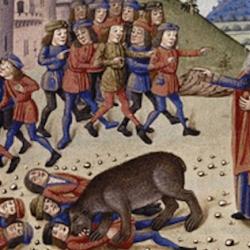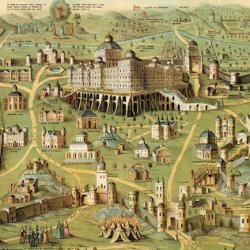An Eternal Kingdom, 1 Kings 16:8-34
INTRODUCTION
Reading 1-2 Kings from beginning to end might give the impression that the book is about the unfaithfulness of Israel. It tells the story of Solomon?s rise and fall, the division of the kingdom, the deterioration of Israel and Judah, and the beginning of the Babylonian exile. It answers the question, Why was Israel sent into exile? and answers, Because Israel worshiped idols and refused to listen to the prophets. If we start at the middle and read outward, we can see that the book is about something else: Not the unfaithfulness of Israel but the faithfulness of God.
THE TEXT
?In the twenty-sixth year of Asa king of Judah, Elah the son of Baasha became king over Israel at Tirzah, and reigned two years. And his servant Zimri, commander of half his chariots, conspired against him . . . .?E(1 Kings 16:8-34).
COUNTERFEIT DAVID
Our sermon text tells the life history of Omri, the founder of the strongest dynasty in the history of the Northern Kingdom. Scripture tells us little about him, but what it tells us is significant. Nearly every detail parallels the life of David.
-The king before Omri is Zimri. Zimri?s reign lasts only a week, and he dies by setting fire to the king?s house in Tirzah and letting it burn down over him (1 Kings 16:18). This reminds us of Saul?s suicide (1 Samuel 31:3-4).
-Prior to becoming king, Omri serves as ?commander of the host?E(1 Kings 16:16), a position similar to David?s under Saul (1 Samuel 18:13).
-As commander, Omri fights Philistines (1 Kings 16:15-16). David makes his reputation as a warrior by fighting the Philistine giant Goliath and by killing his ?ten thousands?Eof Philistines (1 Samuel 17; 18:6-7, 20-30).
-After Zimri?s death, Omri fights a civil war against Tibni ben-Gineath and Omri eventually prevails (1 Kings 16:21-22). This is like ?long war?Ebetween David and Ish-bosheth of the house of Saul (2 Sam. 3:1).
-Both David and Omri have two capitals during their reigns. After defeating Ish-bosheth, David remains in Hebron for seven-and-a-half years (2 Samuel 5:5) before conquering Jerusalem and making it his capital (2 Sam. 5:6-16). After conquering Tibni, Omri retains the capital at Tirzah for six years (1 Kgs 16:23) before purchasing Samaria (v. 24).
-David conquers his capital, while Omri buys his. But Omri?s purchase of the hill of Shemer is like David?s purchase of the threshing floor of Araunah in Jerusalem (2 Samuel 24:18-25).
Omri promotes idolatry in the Northern kingdom, something David never did (16:25). He is like David, but basically unlike David. He is a counterfeit David, and his dynasty is a counterfeit Davidic dynasty.
END OF THE OMRIDES
Curiously, the end of the Omride dynasty is similar to the end of the Southern kingdom of Judah. Jehu, who destroys the Omrides, moves from the destruction of a royal house to the destruction of a house of worship, the house of Baal in Jerusalem (2 Kings 10:18-36). Likewise, 2 Kings 25 says that the Chaldeans slaughter the sons of Zedekiah and take him into exile (vv. 1-7), and then describes the destruction of the house of Yahweh in Jerusalem (vv. 8-17).
Moreover, following Jehu, there is not a Davidic king in Jerusalem. After seven years of Athaliah?s reign, Joash, a descendant of David, is restored to the throne in Jerusalem (2 Kings 11). There is a revival of David?s dynasty. Likewise, after the Babylonians destroy the temple, there is no Davidic king in Judah.
Hence, at the center of the book of Kings is a story about a Northern dynasty that has a similar shape to the big story of the Davidic kingdom in the South.
ANOTHER DAVID
Even before Ahab, the history of the Northern Kingdom has similarities to the history of the Davidic dynasty. Jeroboam is the first king of the Northern kingdom, and his life-story is found in 1 Kings 11. Like Omri, Jeroboam is a counterfeit David:
-Jeroboam begins as a servant to Solomon (1 Kings 11:26-28), as David is to Saul.
-A prophet, Ahijah, tells Jeroboam he will be king over ten tribes (1 Kings 11:29-39). Samuel the prophet anoints David while Saul is still king (1 Samuel 16).
-After Solomon learns that Jeroboam is going to be king, he tries to kill Jeroboam (1 Kings 11:40), as Saul tries to kill David (1 Samuel 18:10-11).
-Jeroboam flees to Egypt for safety (1 Kings 11:40), as David flees to Philistia (1 Samuel 27:1).
-After Solomon?s death, Jeroboam and takes control of a part of the kingdom (1 Kings 11:42; 12:1-24). David returns to the land after Saul?s death and rules Judah and then the rest of the tribes.
-Jeroboam is like Solomon because he builds a high place (like the temple) and establishes a new way of worship for the Northern tribes (1 Kings 12:25-33).
There are also parallels between the fall of the Northern Kingdom and the fall of the South, that is, between the fall of Jeroboam?s kingdom and the fall of David?s. The Northern Kingdom ends like this: Hoshea, the last king of Israel, rebels against the Assyrian king (2 Kings 17:1-4a), leading the Assyrians to invade Israel, besiege Samaria, and take Israel into exile (17:5-6). After the Northern king falls, a temple is destroyed: Josiah destroys the shrine at Bethel (2 Kings 23). Finally, after the North falls, Jerusalem is threatened (2 Kings18:1-8). The fall of the Davidic kingdom is very similar: Jehoiakim of Judah rebels against Babylon (2 Kings 24:1), leading the Babylonians to invade Judah, besiege Jerusalem, and take Judah into exile (24:10-17). Nebuchadnezzar kills kings and destroys Solomon?s temple, and the Davidic kingdom comes to an end.
AN ETERNAL KINGDOM
Each of these stories ends on a happier note. After Jehu destroys the house of Ahab, and Athaliah kills the royal seed of David, Yahweh preserves Joash, who restores the Davidic line and leads a revival of Judah (2 Kings 11). After the Assyrians destroy the Northern Kingdom, Yahweh delivers Jerusalem, and Hezekiah leads a revival in Judah (2 Kings 18-19). And, after Nebuchadnezzar has destroyed Solomon?s temple, the same thing happens: At the very end of kings we read of Jehoiachin, who is brought out of prison in Babylon and given a place at the table of King Evil-Merodach (2 Kings 25:27-30).
Once destroyed, Omri?s dynasty stays dead, and so does the Northern Kingdom. But for the Davidic kings, every destruction is followed by rebirth (2 Samuel 7). The story of Kings is not about Israel?s death only; it is about Israel?s death and resurrection.
Catechism for young saints
How is Omri like David?
Omri fights Philistines, as David did; he fights as civil war; he has two capital cities, and he buys a portion of Samaria.
What is Kings about?
Kings is about Israel?s unfaithfulness to Yahweh, and about Yahweh?s faithfulness to Israel.











